Located on a quiet, leafy lane near Shida Night Market in Taipei, Mooi Trouve (找到魔椅), which opened earlier this month, breathes new life into a worn-down, single-family home built during the Japanese colonial era. The warm, heady fragrance of cypress wood greets visitors as they walk into a small store in front that sells vintage home accessories imported from Europe, while the spacious cafe takes visitors back nearly 70 years into the history of Taiwanese residential architecture.
Mooi Trouve is the latest project of Minfu Chien (簡銘甫), who launched Mooi in 2004 as a vintage furniture importer. The brand now includes a furniture store on Qingtian Street (青田街) next to Ecole Cafe (學校咖啡館), Chien’s first coffee shop, and Fabrik (加工廠), which focuses on European design from the 1920s to 1950s. (Chien recently closed Mooi’s first location on Fujin Street, 富錦街.)
Chien began planning Mooi Trouve three months ago after a friend told him that National Taiwan University (國立臺灣大學, known as Taida, 台大) was seeking a tenant for the structure near Taishun Street that once served as faculty housing. Built in 1943, it had stood empty for several years along with other similar structures owned by the school. Taida is now seeking business owners to occupy the former residences, many of which were constructed during the Japanese colonial era, and turn them into cafes or stores.
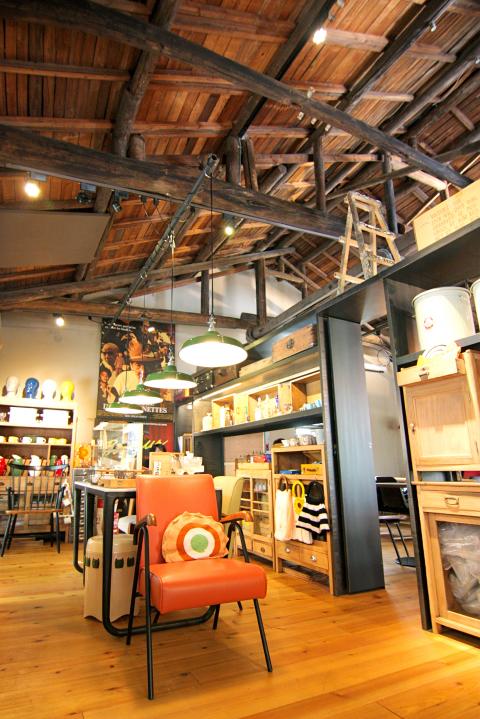
Photo: Catherine Shu, Taipei Times
When the Mooi Trouve renovation team began working on the house, they expected the project to take three weeks, but ended up spending twice that time because the building was more run-down than Chien had anticipated.
“Taida said we could do anything we wanted inside, as long as we preserved the exterior’s original appearance,” Chien says.
While tearing out the rotted floorboards, workers discovered that the wooden planks had simply been laid on top of bricks without any fasteners. The entire floor had to be redone, but Chien kept the walls and roof intact. The property came with an adjacent parking lot that was turned into a wooden deck, complete with vintage theater seats, two painted wooden carousel horses salvaged from the Taipei Children’s Recreation Center (台北市立兒童育樂中心) and a play area with a pint-sized slide.
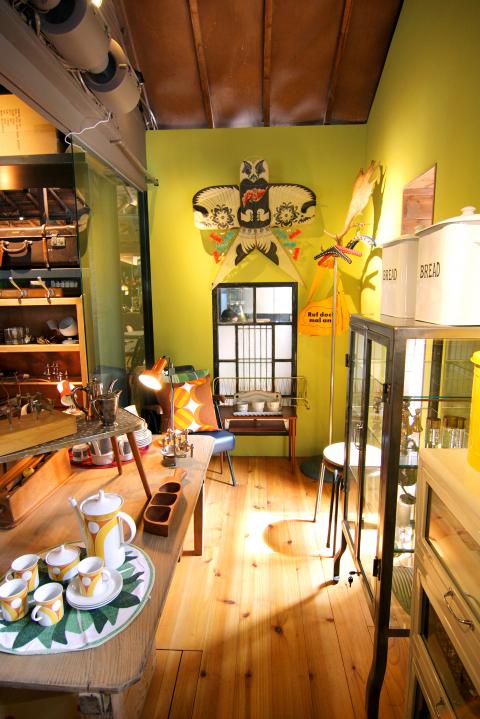
Photo: Catherine Shu, Taipei Times
The cafe’s interior design spotlights the soaring ceiling with its sturdy cypress beams.
“People look up as soon as they walk in,” Chien says. “We don’t want anything to distract from that.”
Chien chose neutral colors for the furniture and kept the unpainted walls bare except for a few movie posters. Tables were custom built for the space, but most chairs, which include mid-century modern and industrial styles, were once used in German schools or gyms in the 1960s and 1970s; many lighting fixtures are also vintage.
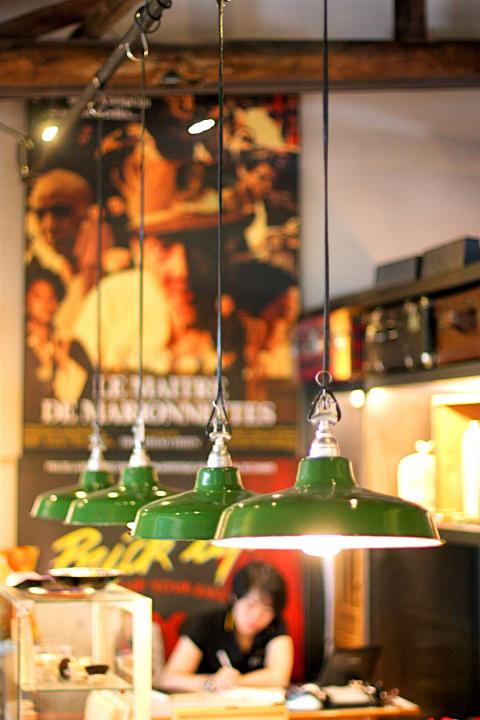
Photo: Catherine Shu, Taipei Times
Across the wooden deck is a single-story house similar in design to the Mooi Trouve building. Chien installed floor-to-ceiling windows on that side of the cafe to spotlight its neighbor’s silhouette.
“We want to make sure there is a connection to the house next door,” Chien says.
Mooi Trouve’s design elements create an interior that is expansive and airy but homey. The building’s wooden structure and floorboards absorb sound even when the cafe is full. Though Mooi Trouve only opened this month, it already has a steady stream of visitors even on weekdays, many settling in with their books or laptops.
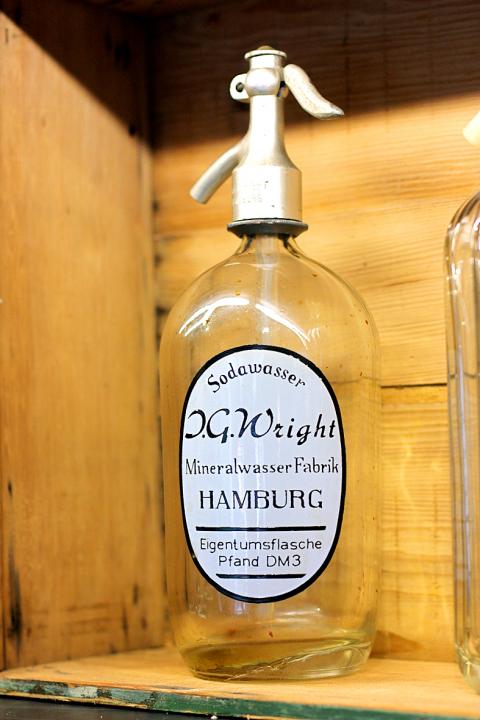
Photo: Catherine Shu, Taipei Times
“We wanted to create an easygoing atmosphere, nothing too deliberate,” Chien says. “We don’t mind if people hang out here for a while.”
The shop sells an assortment of new and old items from Europe. Chien goes on buying trips frequently and estimates that he spends at least half of each year abroad. He visits Germany the most, but also drives throughout Europe and makes occasional forays to other continents (South America is next on his itinerary).
The current selection includes Chinese paper bat kites, vintage Steiff stuffed animals, embroidered napkins from a Paris flea market and enameled dishes. German-made natural bristle and wood brushes in unusual shapes are displayed in a glass case. Other new items, such as wall hooks created from bicycle gears, buttery leather pouches and sturdy tote bags sewn from museum exhibition banners, are made by local designers. Small wooden hand-weaving shuttles are displayed next to old street signs and address plaques, while one shelf is topped with a row of ceramic and glass heads once used by milliners to block and display hats. Most home accessories and dishes in the store range from NT$500 to NT$2,000.
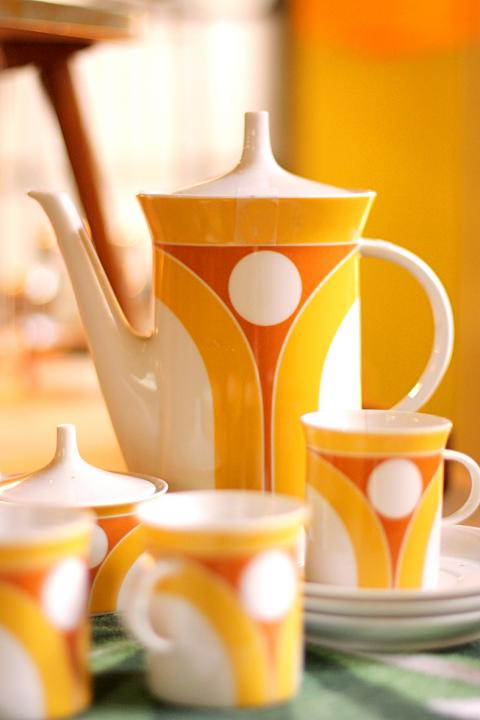
Photo: Catherine Shu, Taipei Times
“I like to bring back odd things from each country I travel to,” Chien says. “I like finding things that people over there might consider really commonplace, but that are strange and exotic to us.”
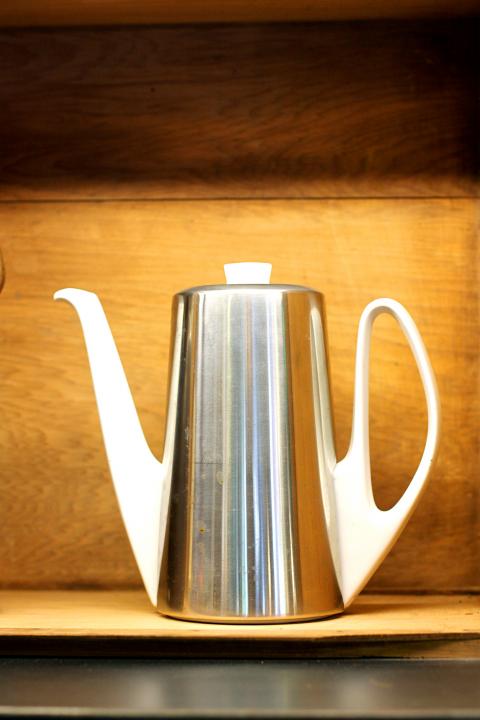
Photo: Catherine Shu, Taipei Times
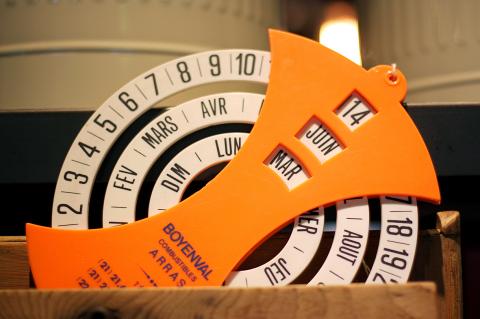
Photo: Catherine Shu, Taipei Times
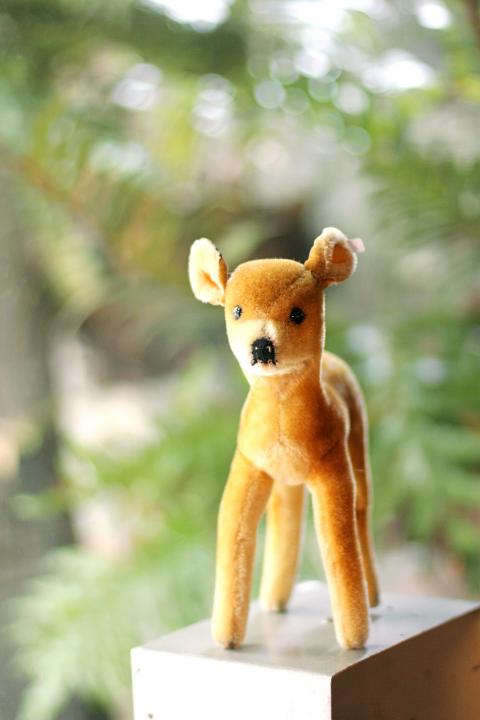
Photo: Catherine Shu, Taipei Times
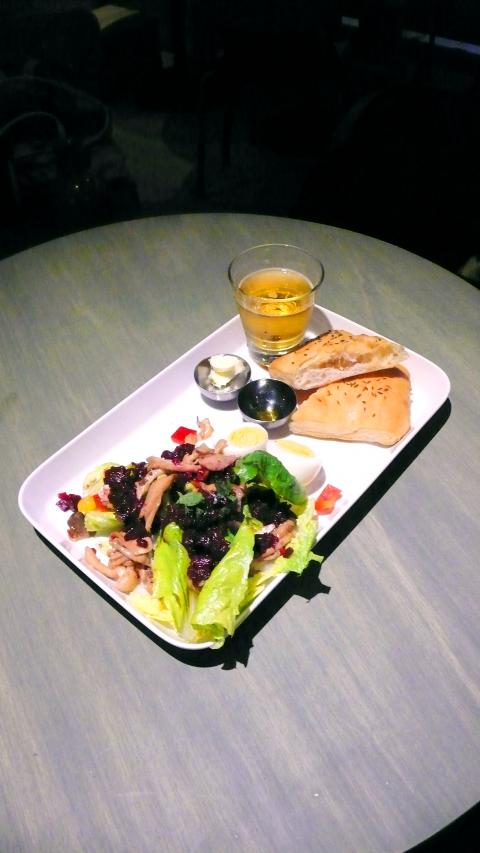
Photo courtesy of Mooi Trouve
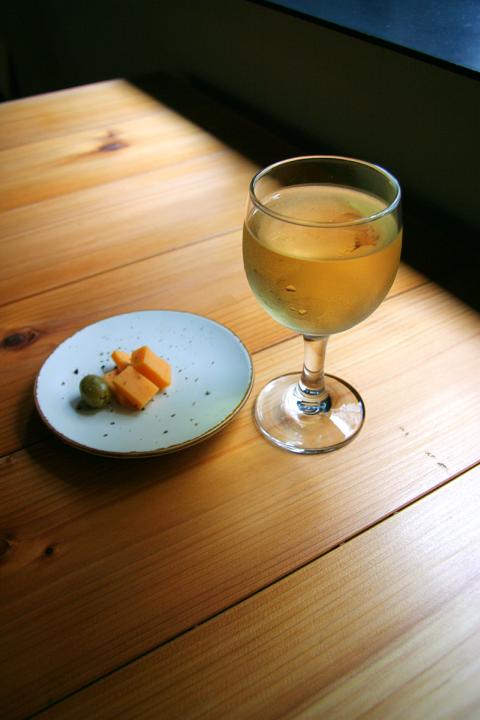
Photo courtesy of Mooi Trouve

Growing up in a rural, religious community in western Canada, Kyle McCarthy loved hockey, but once he came out at 19, he quit, convinced being openly gay and an active player was untenable. So the 32-year-old says he is “very surprised” by the runaway success of Heated Rivalry, a Canadian-made series about the romance between two closeted gay players in a sport that has historically made gay men feel unwelcome. Ben Baby, the 43-year-old commissioner of the Toronto Gay Hockey Association (TGHA), calls the success of the show — which has catapulted its young lead actors to stardom -- “shocking,” and says

Inside an ordinary-looking townhouse on a narrow road in central Kaohsiung, Tsai A-li (蔡阿李) raised her three children alone for 15 years. As far as the children knew, their father was away working in the US. They were kept in the dark for as long as possible by their mother, for the truth was perhaps too sad and unjust for their young minds to bear. The family home of White Terror victim Ko Chi-hua (柯旗化) is now open to the public. Admission is free and it is just a short walk from the Kaohsiung train station. Walk two blocks south along Jhongshan

The People’s Republic of China (PRC) invaded Vietnam in 1979, following a year of increasingly tense relations between the two states. Beijing viewed Vietnam’s close relations with Soviet Russia as a threat. One of the pretexts it used was the alleged mistreatment of the ethnic Chinese in Vietnam. Tension between the ethnic Chinese and governments in Vietnam had been ongoing for decades. The French used to play off the Vietnamese against the Chinese as a divide-and-rule strategy. The Saigon government in 1956 compelled all Vietnam-born Chinese to adopt Vietnamese citizenship. It also banned them from 11 trades they had previously

The 2018 nine-in-one local elections were a wild ride that no one saw coming. Entering that year, the Chinese Nationalist Party (KMT) was demoralized and in disarray — and fearing an existential crisis. By the end of the year, the party was riding high and swept most of the country in a landslide, including toppling the Democratic Progressive Party (DPP) in their Kaohsiung stronghold. Could something like that happen again on the DPP side in this year’s nine-in-one elections? The short answer is not exactly; the conditions were very specific. However, it does illustrate how swiftly every assumption early in an